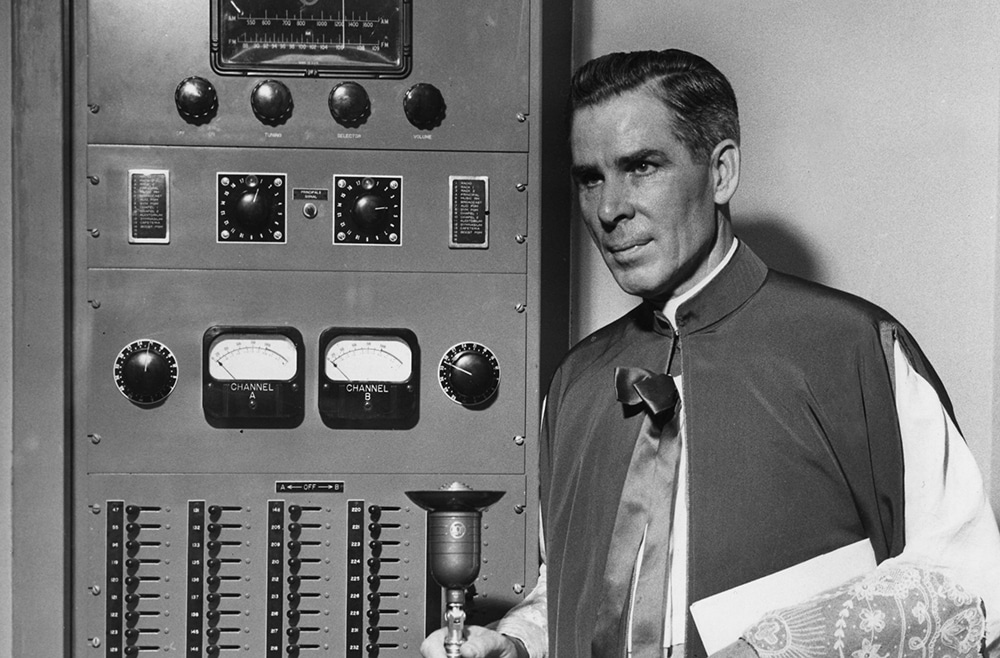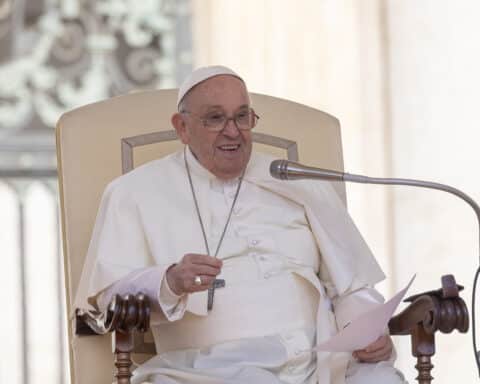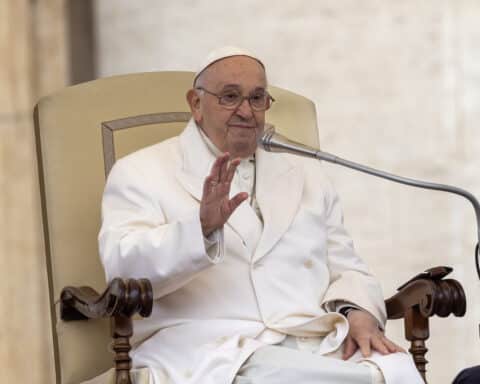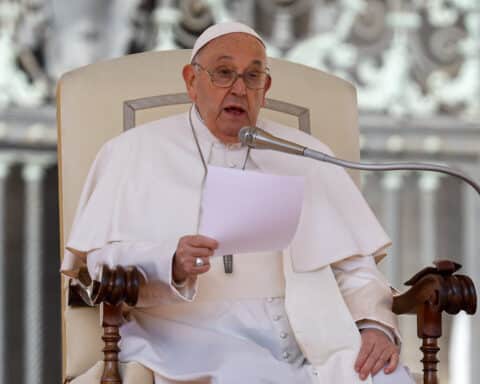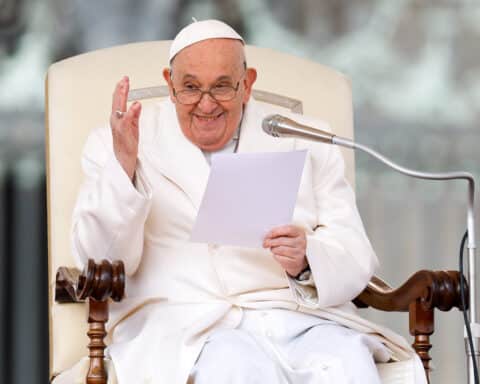Editor’s note: The Dec. 21 beatification of Archbishop Fulton J. Sheen was postponed by the Vatican until further notice.
With his beatification, Fulton J. Sheen will be memorialized in the Church for reasons far beyond his contributions to the Church’s intellectual life or his evangelical zeal, incredible and legendary though they are. As the Church prepares to acknowledge the reasonable hope that he is in heaven, Sheen’s life of heroic virtue now belongs to the ages — and indeed, what better could be remembered about his or any life?
Sheen is a model for those striving for holiness. Through his practice of the theological and cardinal virtues, which comprise the primary characteristics of candidates for sainthood, Sheen’s life gives a glimpse of what ours could and should resemble.
Faith
Faith illuminated Sheen’s life above all else. He knew that his Redeemer lives, and it shaped and defined everything about him. “If you do not live what you believe, you will end up believing what you live,” Sheen once said.
The strength of Sheen’s faith meant he could do nothing other than dedicate himself to the mission of making Christ known and beloved. Initially immersed in academia, Sheen studied philosophy and theology. He wrestled with the enduring questions of faith and reason, and, as a professor, he clearly taught their integration.
| Related Reading |
|---|
| Celebrating the life and legacy of Archbishop Fulton Sheen |
A successor of the Twelve, Sheen possessed a faith marked by an apostolic zeal for souls. He put his many gifts to the service of transmitting God’s word in fresh, attractive and convincing ways, and the internal depth of his faith came across so magnetically that he attracted millions to the truth.
A faithful son of the Blessed Mother, Sheen devotedly adhered to her example. He abandoned himself to God’s providence, following Mary’s directive to do whatever Christ tells us.
Hope
Sheen had a great hope and longing for eternal life. He trusted that God was in control and that God’s designs all worked for the good. To multitudes, Sheen imparted that life truly is worth living.
Amid troubled times and with a joyful persuasion, Sheen proclaimed to the world that because of Christ’s death and resurrection, we know God has the final word. Sheen gave people reasons for hope amid darkness. Ultimately, he wanted others to desire eternal life as much as he did.
Sheen’s exercise of hope also meant he knew the importance and value of suffering as a share in Christ’s cross. Well-acquainted with suffering, Sheen trusted that not only did it have a purpose for the good, it was to be embraced for our salvation. He once said, “In the end, we will discover that sometimes when we are very good the suffering is to make us better, and we will have a higher place in heaven.”
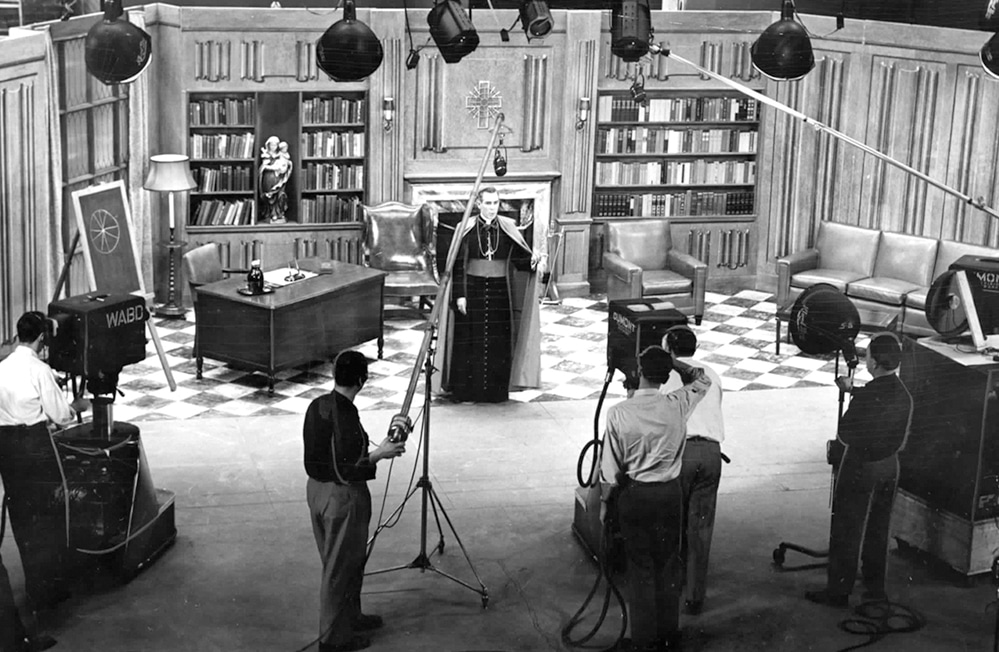
Charity
Charity is intrinsic to the Christian life. St. Paul said it is the “greatest” of the virtues. As Sheen put it himself, “it does not require much time to make a saint. It requires only much love.”
Sheen once said that “the greatest love story of all time is contained in a tiny white host.” This was the love that transformed him. His daily Eucharistic Holy Hour was legendary. From the day of his ordination to the day of his death, Sheen spent an hour a day praying in the presence of the Blessed Sacrament. From his office desk, through an open door, he could gaze upon the tabernacle at all times. His union with Christ enabled him to more fully, more accurately and more convincingly lead others to Christ in all he said and did. Sheen was a man of many talents and accomplishments, but it was Christ who enabled him to use them in the best ways.
It was charity that motivated Sheen’s zeal for souls. Bringing others to Christ was the greatest good he could perform in service to them, and it often came in the form of self-sacrifice. With a pastoral heart, Sheen lived for others. He offered wise counsel with fatherly love. And he gave of himself constantly. Even his time was not his own, for he devoted himself to his studies and in preparation for his ministry of evangelization, for work on behalf of the missions or in the diocese that he governed.
Where Sheen saw a need, he responded in charity. He loved his neighbor as himself. He once preached about our judgment: “Show me your hands. Have you a scar from giving? A scar of sacrificing yourself for another? Show me your feet. Have you gone about doing good? Were you wounded in service? Show me your heart. Have you left a place for divine love?”
Sheen’s love of Christ also was manifested in a love for the poor and marginalized, often in hidden ways. He also worked to raise funds for the foreign missions and donated the vast majority of the earnings from his books and television show for that purpose. “Never measure your generosity by what you give, but by what you have left,” Sheen wrote.
Prudence
Sheen exercised prudence by trusting in God’s providence. It attuned him to listen for God’s voice, even when God spoke through others. Sheen did not rush to judgments, taking time to prayerfully discern. When he listened to others, either those who were seeking advice or those who were giving it to him, Sheen exhibited a twofold attentiveness: first, to the person with him, but, moreover, to what God might be saying in the given situation. This was no easy task for a man of Sheen’s enormous responsibilities and fame.
A supernatural prudence shone through his dealings with others. Keenly aware of how greatly others admired him or wanted to be in his inner circle, Sheen navigated such relationships with grace and distinction, employing equal amounts of caution and concern.
Justice
Sheen acted with justice toward God and others. Not taking himself too seriously, Sheen recognized that any talents he had were because of God working through him. In all that he said and did, Sheen remembered that his work was the Lord’s. Known for leading many to the Faith, particularly through his media ministry, Sheen once was asked by Pope Pius XII how many converts could be attributed to his work. Sheen replied, “I am always afraid if I did count them, I might think I made them, instead of the Lord.”
Sheen’s preaching and teaching also demanded the dignity of the human person. That all are made in the image of God was no abstract theological concept for Sheen, but it was a lived reality. Sheen advocated for social justice — from racial harmony to an end to war and violence. He treated people equally and made himself available to all, no matter their status. Sheen was approachable to the greatest as much as to the least.
Fortitude
Sheen exhibited fortitude amid an abundance of difficulties in both private and public life. Committed to a life of holiness and virtue, he refused to compromise on his own convictions and beliefs. In the face of trials, Sheen remained a joyful and indefatigable herald of the Gospel, admired for maintaining peace of the soul.
Sheen’s happiness was found in the knowledge that God always brings good out of any situation. Publicly, Sheen’s fortitude was seen in his preaching of hard truths. Consider here his prophetic critiques of American society or his staunch denunciations of communism at the height of its flourishing. Amid his successes and popularity, Sheen quietly yet bravely faced envy, contempt and their resulting pain — especially from other members of the hierarchy.
“The real test of the Christian then is not how much he loves his friends,” Sheen once wrote, “but how much he loves his enemies.” By the end of his life, a purified Sheen could say, “I’ve had a great deal of suffering in the 83 years of my life — physical suffering, and other suffering, which should never [have] happened, but lasted over many years. And yet, as I look back, I know very well that I have never received the punishment that I deserved. God has been easy with me.”
Sheen exhibited heroic doses of self-control, humility and kindness, which also were antidotes to the temptations presented to him throughout life, especially those associated with his accomplishments, accolades, position and fame.
Temperance
Sheen allowed God to reign in his heart. As a man of temperance, he was not controlled and dominated by the passions of the will. He was not known for immoderate temper or humiliation of others, but instead for an attractive peacefulness that he achieved through self-control and moderation. In his interactions with others, Sheen often was meek, easy-going and gentle.
Not dependent or attached to earthly goods, Sheen’s habits of life were marked by simplicity, though he also appreciated the finer things of life. Not intent on storing up worldly treasures, Sheen cultivated a storehouse for eternity. He acknowledged his own sinfulness and sought reconciliation.
In the end, Sheen knew, like St. Augustine, that only in God could his heart find rest.
Michael Heinlein is editor of OSV’s Simply Catholic and a graduate of The Catholic University of America. He writes from Indiana.
| THE BEATIFICATION OF FULTON SHEEN |
|---|
|
WHEN: Venerable Archbishop Fulton Sheen will be beatified on Dec. 21 at 10 a.m. (CST). His beatification means that he will be known as “Blessed” and that he can be venerated publicly in the Diocese of Peoria.
WHERE: The beatification Mass will be held at the Cathedral of St. Mary of the Immaculate Conception in Peoria, Illinois — the same cathedral in which Archbishop Sheen was ordained a priest 100 years earlier on Sept. 20, 1919. It is also the resting place for Sheen, who is entombed in a marble vault next to the altar where he was ordained. FEAST DAY: According to the Diocese of Peoria, Blessed Fulton Sheen’s feast day will be celebrated by the diocese on Dec. 9 — the date he died in 1979. VIEWING THE MASS: The Diocese of Peoria will be live-streaming the beatification ceremony online. For more information, visit celebratesheen.com. |

